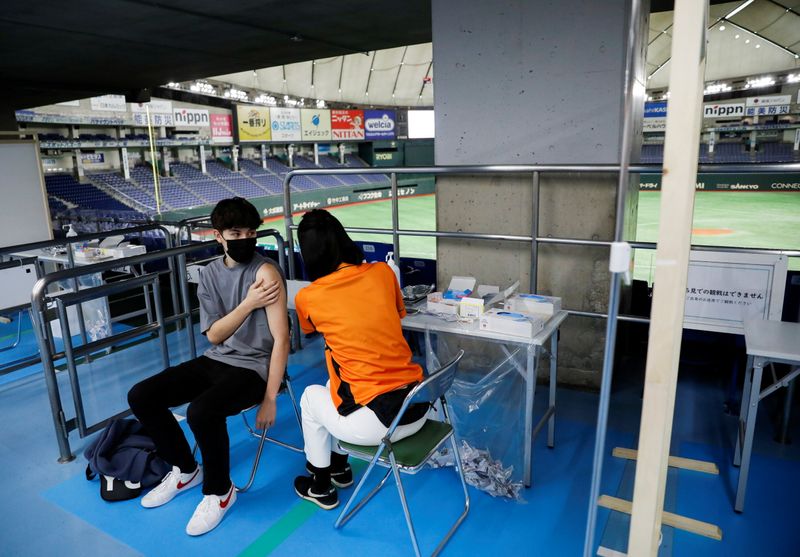
Top Japanese adviser blasts IOC’s Bach as wider COVID-19 curbs planned By Reuters

© Reuters. FILE PHOTO: A man receives a dose of the coronavirus disease (COVID-19) vaccine at Tokyo Dome, the home ground of Japanese professional baseball team Yomiuri Giants which is being used as a large-scale coronavirus disease (COVID-19) vaccination center, in
2/2
By Chang-Ran Kim and Daniel Leussink
TOKYO (Reuters) -Japan’s top medical adviser blasted International Olympic Committee President Thomas Bach on Wednesday for visiting Tokyo again when the country is expanding emergency curbs to contain the COVID-19 pandemic.
Japan is set later on Wednesday to expand states of emergency to eight more prefectures, taking the total to 21 regions from Hokkaido in the north to the southern island of Okinawa under curbs and covering nearly 80% of its population.
The unusually blunt statement from a Japanese official underscores the frustration felt by many as the government grapples to bring infections under control. Citizens are growing weary of life under restrictions and companies are ignoring repeated requests to promote work-from-home.
“We had said over and over ‘What kind of message will the Olympics send to the public?'” Dr Shigeru Omi, the immunologist who chairs the government’s coronavirus advisory panel that approved the emergency plan, said in a parliamentary session.
“We’re asking people to work from home more. If (IOC) President Bach needs to give a speech (for the Paralympics), why couldn’t he do it remotely? Why does he have to bother coming all the way here?” Omi said, drawing applause from a few lawmakers for his remarks.
“That kind of plain, common sense should function under these circumstances,” he said.
Bach attended the Paralympics’ opening ceremony on Tuesday. The IOC did not immediately respond to a request for comment sent by email.
Omi voiced strong concerns about holding the 2020 Games, while others in the medical community opposed them. He warned that infections could spread as the public interpreted hosting the Games as a sign that it was safe enough to go about their normal activities.
Nomura Research Institute executive economist Takahide Kiuchi estimated the latest state-of-emergency expansion would lead to an additional economic loss of about 420 billion yen ($3.83 billion), bringing the total fallout from Japan’s fourth round of emergency curbs to 3.84 trillion yen.
That dwarfs the 1.68 trillion yen boost the economy was expected to see from holding the Olympic and Paralympic Games, he estimated.
HOSPITAL BEDS SHORT
Months of emergency curbs in the capital, Tokyo, and surrounding areas have failed to reverse a surge in infections and about 90% of the city’s critical care beds are occupied.
The state-of-emergency expansion plan that is expected to be formally approved this evening will add Hokkaido, Aichi, Hiroshima and five other prefectures starting from Friday through to Sept. 12.
Another four prefectures are expected to be added to the more limited “quasi-emergency” measures, bringing the regions under those curbs to a total of 12 out of Japan’s 47 prefectures.
Restrictions in Japan have been looser than lockdowns in other countries and have centred on mandates for restaurants to close by 8 p.m. (1100 GMT) and stop serving alcohol, and requests for companies to have 70% of staff working from home.
“The working-age demographic is the driving force (behind the rise in infections),” Economy Minister Yasutoshi Nishimura
said. “We need to halve the movement of people.”
He added that infections transmitted by children as new school terms start were another concern.
With hospital beds filled to or nearing capacity, many people have been forced to convalesce at home with some dying before they can get treatment.
“The most important task is to beef up the medical system,” Nishimura said, adding that securing oxygen stations and nurses, as well as considering the use of antibody cocktails for outpatients were among the priorities.
The government reported 21,561 new cases and 30 deaths for Tuesday. Japan’s case fatality rate of 1.2% is lower than the United States and Britain. Deaths have trended higher during August but are below the peaks of earlier this year, according to data from Johns Hopkins University.
($1 = 109.7700 yen)
Stay connected with us on social media platform for instant update click here to join our Twitter, & Facebook
We are now on Telegram. Click here to join our channel (@TechiUpdate) and stay updated with the latest Technology headlines.
For all the latest Education News Click Here
For the latest news and updates, follow us on Google News.

